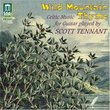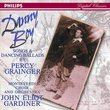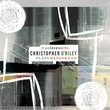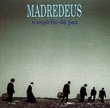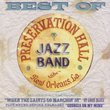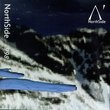| All Artists: Andrey Boreyko, Hilliard Ensemble, SWR Radio-Sinfonieorchester Stuttgart, Aleksei Lubimov Title: Lamentate Members Wishing: 1 Total Copies: 0 Label: ECM Records Original Release Date: 1/1/2005 Re-Release Date: 8/30/2005 Genre: Classical Style: Symphonies Number of Discs: 1 SwapaCD Credits: 1 UPC: 028947630487 |
Search - Andrey Boreyko, Hilliard Ensemble, SWR Radio-Sinfonieorchester Stuttgart :: Lamentate
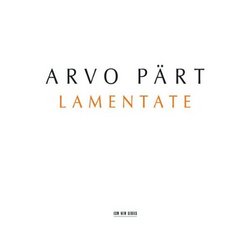 | Andrey Boreyko, Hilliard Ensemble, SWR Radio-Sinfonieorchester Stuttgart Lamentate Genre: Classical
No Description Available. Genre: Classical Music Media Format: Compact Disk Rating: Release Date: 30-AUG-2005 |
Larger Image |
CD DetailsSynopsis
Product Description No Description Available. Genre: Classical Music Media Format: Compact Disk Rating: Release Date: 30-AUG-2005 Similarly Requested CDs
|
CD ReviewsPart - still a joy to hear, at 70 Bob | Michigan's thumb, US | 09/13/2005 (5 out of 5 stars) "I am not one of the well-educated and thoughtful reviewers who ought to be writing here. Soon, I hope, they will, and I'll read them eagerly. But in their absence, perhaps my poor words may help someone considering this new CD. I have to admit to a further disadvantage - as soon as I received ECM's broadcast email about this CD on a Friday, I downloaded it so I could have it for Labor Day weekend; thus I have not seen the liner notes. I wish the labels would offer those, perhaps as separate downloads at a separate price, for fools like me. The title of Part's work bothered me: Is it Latin? My school Latin is buried under many years, like Babylon under sand. But would that be the plural imperative of "to lament", meaning "lament, you guys!"? I had the sense to Google it and found that, actually, the work was inspired as an "homage to Anish Kapoor and his sculpture", particularly a piece, Marsyas, displayed at the Tate Galleries - where this piece was first performed. It is not "Lamentate" but rather, "LamenTate." Marsyas, by the way, was the mythical fellow defeated by Apollo in a musical talent show, and then flayed alive for his trouble. The ten pieces under that title seem, to my not-so-wise ears, to be something of a reconsideration of the ideas a younger Part put forth in 1968's "Credo", which I know through Helene Grimaud's CD. (Interestingly, at least to me, when the piece debuted at the Tate, she was the solo pianist, although Aleksei Lubimov takes that part - quite well - on this recording.) LamenTate I begins in an undercurrent of percussion, then horns blow discrete notes into a silence, and soon tympani rumble again like a train passing two levels below us. In II, the full orchestra joins, but without the inner antagonism of Credo, the harsh clash of voices/piano/strings struck down by the mechanical forces of brass and percussion. This time out, 30+ years since the Soviets banned "Credo", Part is not contrasting the humane and divine spirit against the hulking mechanism of a totalitarian state. Part has been in the west for a quarter century; for 15 of those years his old foe, his old home, the Soviet Union, has not even existed. Later it is but strings behind a few sparse piano notes, as silence again becomes a major part of Part's composition. Then the orchestra returns, united, reflecting this sense of unity in Part's universe. Unlike the [UK] Guardian's reviewer, I found the work very satisfying - but I was already a Part fan. The opening piece, the a capella Hilliard Ensemble performing "Da Pacem Domine" - ah, there's a singular imperative, "da": Give [us] Peace, Lord - is a lovely and peaceful work. The voices float softly, wordlessly, I think, but I am not sure - brushing tones upon one another. You could buy this CD just for the Hilliard piece, or just for the longer work; it is a joy to get both at once. It's not really relevant, but I'd like to add that I hope many of us can have this clarity and serenity on celebrating our 70th birthdays. " Another essential recording for the Part fan Michael Smith | Calgary, AB, Canada | 10/01/2005 (5 out of 5 stars) "The music of Arvo Part has done something to me that i've never really experienced through any other music. I don't know how he does it, but listening to his compositions always leave me with a feeling of satisfaction, as if i'd learned something and become a better person. In the few short years since i discovered his work, he's move up faster than any other artist as one of my favorites of all time. Lamentate is my 10th Arvo purchase, and once again i am not let down. Anyone familiar with Part knows he has a way with silence, a way of setting up those moments to be the most important of his works. Da Pacem Domine opens the disc with a familiar Part sound that reminds of Magnificat, though perhaps a bit more hopeful and light in sound. The piece slowly moves along with voices moving from consonance to dissonance in the most pleasing way i think can be done, something Part has mastered and implemented in many of his pieces since his period of "silence". The major work of the disc, Lamentate, shows Part doing something a little different from normal. The biggest difference i found was his use of bass frequencies in the Timpani. Perhaps that is more a product of the mixing/mastering, but as a fan of Dark Ambient music, I could not wipe the smile off my face when i heard the low rumblings through my sub at the start of Minacciando. Very ominous, featuring low frequencies not usually found in classical recordings, and surely not for extended lengths of time (not that there is a constant rumble, but it is for more than a mere instance), which adds quite a dark character to the work. Another interesting difference between most Part works and this is how busy some parts are, particularly in the 2nd movement, Spietato. There is a huge crescendo of brass, cymbals, bass drum thumps and plodding piano chords, over some of the most dissonant chordal progressions of Part's career. The effect is brilliant, and for those forunate to have a 5.1 setup with Dolby Pro Logic II, it is remarkable how each instrument has a very defined "space" of the room, something atypical of most classical recordings. Further into Lamentate, the piece takes a very familiar approach that reminds of Fur Alina in more than a few ways. The music quiets down to a hush, featuring very sparse piano playing, with hints of subtle strings at times "hiding" in the background. This is possibly my favorite aspect of the piece, as the music has this dichotomy to it which is absolutely thrilling to hear. It leaves the listener waiting for the next moment the piece might pick up the pace, or explode into a terrifying crescendo (akin to Godspeed You! Black Emperor for those finding themselves here from the Post-Rock spectrum), something that, while not a flaw, was missing from the early Part pieces after his silence. For those already familiar with Part, i unreservedly reccomend purchasing this album, as it is every bit as enthralling as the bulk of Arvo's catalogue. For those new to Part, this would be as good a place as any to start, as all of the elements are here, plus a few new suprises. Arvo part is undoubtably one of the more brilliant musical minds of our time, and something everyone should hear at least once in their life." Meaningful on many levels L. Benjamin | Savannah, GA | 11/22/2005 (5 out of 5 stars) ""Lamentate" is a multi-level work, inspired by Pärt's reaction to Anish Kapoor's sculpture "Marsyas" at the Tate Modern. The sculpture was itself inspired by the incident in Greek mythology. Marsyas was an accomplished flutist, who entered into a musicianship contest with Apollo. It was agreed beforehand that the victor could do whatever he liked with the loser. Apollo played the lyre, having improved its design by adding four strings to the original three designed by Hermes.
The initial results of the contest were inconclusive. Two accounts exist as to its resolution. In one, Apollo turned his lyre upside-down and played it that way, a feat impossible to duplicate with a flute. In the other, Apollo sang while playing. When Marsyas pointed out that the voice was a separate instrument, Apollo countered that it was merely breath, which was what Marsyas was using when he played his flute. In any event, Apollo was judged the winner. For his reward, he chose to flay the skin from Marsyas' living body. Afterwards, Apollo felt so remorseful that he removed the four strings he had added to his lyre and thenceforth played only with the original three. "Lamentate" is a departure for Pärt, having more in common with his 3rd Symphony than more recent "tintinnabuli" works. Not exactly a piano concerto, it has more affinity with Messiaen's "Turangalila" Symphony in that the piano is more a part of the orchestra rather than in the foreground. Like that work, it is also comprised of multiple and highly varied movements. The enclosed booklet contains no translation of the unusual movement names. Although I do not speak Italian, I was able to translate it with the aid of an on-line translation site. I am including the results for anyone interested in adding this dimension to the work. Lamentate: Complainingly Minacciando: Threatening Spietato: Pitiless Fragile: Fragile Pregando: Praying Solitudine - stato d'animo: Solitude - state of mind Consolante: Consoling Stridendo: Squeaking Lametabile: Lamentably Risolutamente: Decidedly Fragile e conciliante: Fragile and Conciliating "Lamentate" in its choice of instrumentation and varied structure may represent another stylistic shift for this composer, possibly in the direction of finding some unification of his past styles. At an age when many of the surviving rock `n' roll icons of the 1960s consider themselves fortunate if they can still drag themselves onstage and belt out their hits from 30 years ago, Pärt is coming into the height of his powers. The excellence of "Lamentate" in concept and execution leads me to risk the prediction that Pärt's best work still lies ahead of him." |

 Track Listings (11) - Disc #1
Track Listings (11) - Disc #1